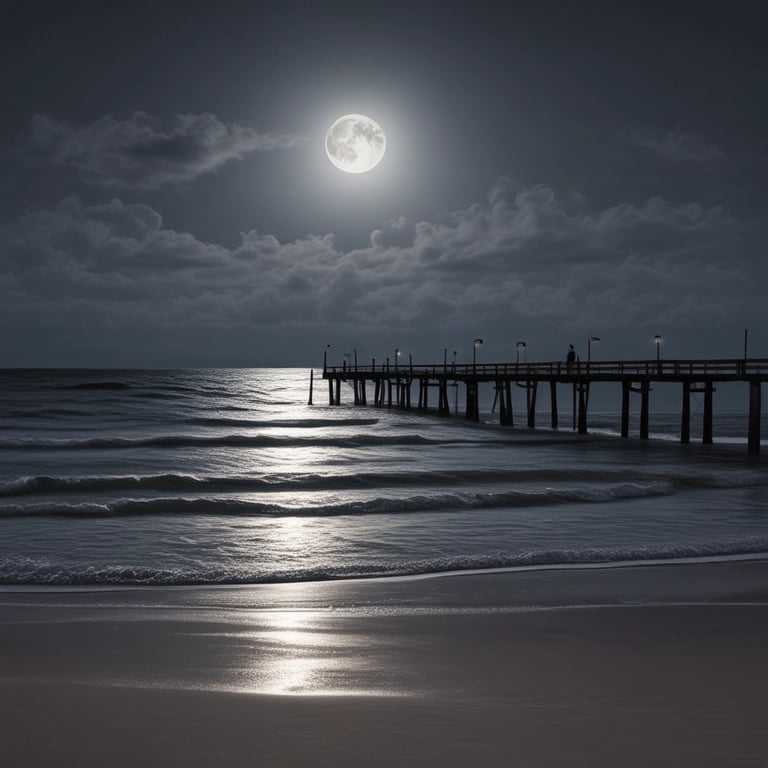Essays and Conversations on Community & Belonging
A Pier for a Paralyzed Mind: The Healing Power of the Beach
Why do we find the beach calming when the ancient Greeks saw it as a place of dread? Explore the history of our relationship with the coast and the science of "Blue Mind."
PSYCHOLOGY & PERSONAL GROWTHANALOG DISSENTTHE ARCHITECTURE OF THE SELF999 ETHOS
Alex Pilkington
8/4/20254 min read
I’ve always had a deep love for the beach. It’s a love that holds up, even with all the sand that gets into everything forever and the crowds of drunken sunburned tourists. There’s just something about standing at the edge of that endless water that makes your own problems feel incredibly small. The constant, rhythmic crash of the waves acts like a metronome for your breathing, washing away tension with every cycle. It’s a connection I’ve always felt most strongly at night, after the day's heat and the crowds have disappeared, leaving behind a quiet, moonlit solitude.
I grew up on the beach, but I don’t think I fully appreciated it until it became the place I went to figure things out. My final semester in school, as graduation loomed and decision paralysis engulfed me - I’d go to the Naples Pier in the dead of night to think about what I wanted to do with my life. Some pretty life-altering decisions were made there, often times with some added help from a blunt to clear the mind.
I’m not alone in this feeling. Beach vacations are now one of the most popular ways to get away. A report from Statista showed that about a third of Americans and Canadians have taken a beach trip in the last year.
But this modern love affair with the coast is the complete opposite of how the ancient Greeks felt. For them, the beach was a place of dread and desolation. Our entire relationship with the sea has been transformed by shifts in our culture, technology, and scientific understanding.
The ancient Greeks, even though they were expert sailors, had a deep-seated fear of the sea and its shores. In their stories and cultural practices, the beach wasn't a place to relax; it was a site of hardship, danger, and death. They saw the coastline as a sterile, "unharvested" wasteland and represented the exact opposite of the fertile fields that gave them life.
Even the sensory experience was negative. To them, the smell of brine and seaweed was repulsive. The sound of crashing waves wasn't soothing; it was compared to the terrifying noise of a battle. The beach was a desolate threshold between the known world of the living and the chaotic, unpredictable realm of the sea, which they often linked to the underworld. It was where you went to mourn the dead, and the sand was often chosen as a place for tombs. This viewpoint makes sense when you remember that for them, the sea was an untamable force of sudden storms, pirates, and invasions which served a constant, threatening reminder of how vulnerable they were.
Fast forward to today, and our view has done a complete 180, something now explained by the concept of the "Blue Mind." This theory, backed by a growing pile of scientific research, says that just being near water can make us feel calm, peaceful, and happy. The modern beach experience is all about positive sensory input. The gentle lapping of waves, the vast blue horizon, and the fresh sea air trigger a relaxation response in our bodies. Studies show it can lower stress hormones like cortisol and boost the chemicals that make us feel happy and connected, like serotonin. The beach has become a space for mindfulness and reflection, a place that inspires awe and triggers happy memories, cementing its status as our go-to spot for rest and rejuvenation.
So, what caused the shift from the Greek "beach of dread" of antiquity to our modern "beach of bliss"? It comes down to a few key developments.
First, we just got way better at not dying at sea. Sophisticated navigation, reliable ships, and accurate weather forecasting have tamed the ocean’s deadliest impulses. It went from being a source of constant peril to a manageable highway for trade and travel.
Second, our culture changed its view of nature. The Romantic movement in the 18th and 19th centuries encouraged people to appreciate the wild and raw beauty of the natural world. Around the same time, the Industrial Revolution created a middle class with the time and money for tourism. The beach was rebranded from a dangerous frontier into a desirable escape from the city.
Finally, we now have the science to prove what we’ve always felt. Psychology and neuroscience have given us hard evidence of the positive impact of these "blue spaces" on our mental health. This has not only validated our love for the coast but has also encouraged cities to create more access to water for its therapeutic benefits.
While the shore is still the same strip of sand meeting the sea, what it means to us couldn't be more different. For the ancient Greeks, it was a stark reminder of nature's unforgiving power. For us, armed with technology, leisure time, and a scientific understanding of its gifts, it has become a vital source of tranquility and rest. This evolution shows that how we see the natural world isn't fixed; it’s a fluid, ever-changing story shaped by the ideas and tools of our time.
I miss the beach so much.. I need the beach.




